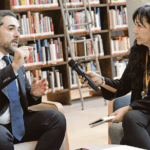THE GAZIANTEP-BASEDpublishing startup, Interesting Engineering, lives up to its name. Founded by Huseyin Kilic, the platform creates popular technology and science-related content in English. The startup has come a long way since 2010, when Kilic first created a Blogspot page with the same name. Now the company aims to reach the other side of the Atlantic to become a global publishing giant.
“This is not easy; there’s blood, sweat and tears in this business,” says Kilic, who had an interest in websites and technology-related content since he was a university student in Gaziantep. Since then, the platform has faced many ups and downs, from declining traffic to Facebook bans, but Kilic still has ambitious targets to strengthen Interesting Engineering. Up to now, the company hasn’t received any investment and grew organically throug its own capital. Although Kilic laid the foundation of the platform more than 10 years ago, it took him nearly six years to actually establish the company.
FIRST MILESTONE: THE FACEBOOK PAGE
“Back then, online businesses weren’t popular and people didn’t know that you can actually profit from them,” Kilic says. Indeed, he did not expect to create a business out of a Blogspot page that he started from an interest in technology and science. “I started adding articles to the Blogspot page in English,” he continues. “One of the articles was called ‘The tallest buildings in the world’ and it had pictures of various buildings, like the Burj Khalifa. After that article, I saw that the platform was visited by thousands of people daily. I was very surprised but later I figured that those numbers were actually people looking at the pictures in Google search, not visitors. Later I found a code that directs people who open the picture to the platform.” But this method reduced daily visits to 600, though it didn’t matter because the website began receiving traffic. “I wanted to monetize this traffic,” Kilic said, who later applied to Google Adsense. “Then I opened a Facebook page for Interesting Engineering. I think this was our first milestone. Facebook pages grew exponentially at that time and from that, the daily traffic of the website saw 15,000. I began earning an income from Google AdSense via the website traffic.”
PROFITABILITY: EARNING IN USD, PAYING IN TRY
“One of the reasons that we advanced without receiving an investment is that we make revenues from overseas and provide employment in Turkey,” Kilic says, although this impacted the company negtively in terms of talent and quality content. Employing nearly 50 people in total, the company, which was established in Turkey but later moved to the U.S., earns dollars and that’s how it receives funding, according to Kilic. “That’s the reason behind our profitability,” he says. “That’s why we advanced slowly but maybe if we received investment or I established the company earlier, we could’ve become a leading publisher in the U.S. We are still eyeing the American market but right now the competition is huge and we are in a period where everyone is a content creator. To operate among them, you need to provide quality content.”
SACRIFICING QUALITY FOR SCALABILITY
Interesting Engineering has been sacrificing quality to scale for a long time. When quality is in question, the audience narrows and when that happens, the revenue models need to be much more complicated and efficient, according to Kilic. “Interesting Engineering had to pull in people in whatever way, viral or clickbait, because ad revenues are a must to scale and move forward without investment,” he says.
THE PRIME OBJECTIVE IS THE FOREIGN MARKETS
Although Interesting Engineering receives 150,000-200,000 views in Turkey, the company currently does not have any plans to offer content in Turkish. “We began in English and going back to Turkish would mean a setback because economically, the status of the Turkish lira against the dollar is risky,” Kilic says. “The effort we put in with 10 people in the U.S. equals 100 people in Turkey because there’s a chasm between the income you receive with 1,000 views in the U.S. with the same amount of views in Turkey. This doesn’t seem rational financially.”
There’s a huge interest in the platform from countries such as India, Brazil and Arabic countries but in the short term, the company does not plan to offer content in different languages. “A lot of people ask me why we don’t offer the same content in Turkish because we are the only platform with this kind of content,” Kilic says. “We would be able to create content in different languages but right now we don’t have enough resources for that kind of operation and a financial outcome for this kind of effort does not seem possible at the moment.”










